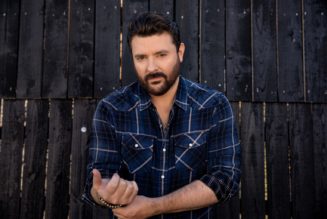
On Friday (Oct. 15), Hurd celebrates another career first with the release of his full-length debut album, Pelago, out via Arista Nashville. The album is a major milestone for the Michigan native, who initially moved to Nashville to be a songwriter instead of an artist. Hurd is signed with House of 42 for management (which also manages Morris), WME for booking and Big Machine Music for publishing.
While studying sociology at Belmont University, Hurd focused on bettering his songcraft, and later found success writing for other artists, including two No. 1 Billboard Country Airplay hits for Luke Bryan, “Sunburn, Sunset, Repeat,” and “Waves.” Hurd also penned “Last Turn Home” for Tim McGraw, “You Look Good” and “What If I Never Get Over You” for cLady A, as well as the Blake Shelton/Ashley Monroe collaboration “Lonely Tonight.”
In 2017, Hurd signed a label deal with Sony Music Nashville and made the leap from songwriter to artist — though success in that realm hasn’t come quickly or easily. His single “Love in a Bar” failed to crack the top 40 on Billboard‘s Country Airplay chart, though “To a T,” from his 2017 EP Platonic, reached No. 22 and was certified platinum.
“Going from being a staff writer in Nashville and having a couple of hits under my belt, you think that’ll translate into either people giving a s–t about your career or you as an artist, or into actually being a good artist,” Hurd says. “And the fact is, songwriting and being a recording artist, they have very little to do with each other. In fact, being an artist in this world is not very musical. It’s a lot of getting on an airplane, just stuff that you never imagined having to do with it.”
On the 15-track Pelago, “Chasing After You” is the rare song Hurd did not have a hand in writing. His devotion to storytelling serves as a through line of the album, which runs the gamut from flirty fare such as “Platonic” and “To a T,” to the string-filled “Tab With My Name On It” — an ode to seeking refuge from heartache in the darkest corner of a bar — to the remorseful “I Never Said I’m Sorry.” Morris has a co-writing credit alongside Hurd, HARDY and Jordan Schmidt on the laid-back, unifying track “Pass It On.”
“I think that I have improved as a writer,” Hurd says. “Just looking at the songs I started with and the songs I write now, I hit the mark more often.”
Hurd co-wrote both of his Luke Bryan hits alongside Chase McGill and Zach Crowell, and says another song from his new album, “June, July, August,” rounds out a trio of beach-inspired tracks from the Hurd-Crowell-McGill collective.
“This was sort of the third version of this trilogy, in a way, just this songwriting trio,” Hurd says. “We felt that after those two, it was like, ‘Okay, I need one of these for me.’ It was my favorite one of the three, just because of there’s some little language things, that sound like the way I would sing it. You need those feel-good summer anthems on a country record and it touches that nostalgia button. It feels like a well-written, feel-good country song, and that’s what I gravitate towards.”
Hurd penned another standout on the album, “The Knife or the Hatchet,” with Jimmy Robbins and Laura Veltz, co-writers behind Morris’ 2019 hit “The Bones.”
“I love how visual the song is,” Hurd says. “Even the first verse talking about two people staring at the ceiling, you can picture that like it’s a movie. Once we figured out the angle, ‘Twist the knife or bury the hatchet,’ the whole rest of the song kind of writes itself. You know the entire story from just that little wordplay. Maybe some people have been with only one person and they’ve never had their heart broken, but I’m pretty sure that most other people have gone through something where they’ve just absolutely been gutted by the end of a relationship or knowing it was over.
“I think Dierks [Bentley] had it on hold,” Hurd continues. “Dierks loved that song, and he would always text me about it and he was always super encouraging about it. Sometimes, when you have other artists encourage you like that, it kind of cements that spot on the album.”
Soon after Hurd moved to Nashville, his hometown friend Aaron Eshuis did the same. Eshuis contributed production to some of Hurd’s previous EPs and continues in that role on Pelago, along with contributions from Jesse Frasure and Teddy Reimer. Along the way, Eshuis also earned his first No. 1 on Billboard‘s Country Airplay chart with Scotty McCreery’s “This Is It” in 2018, and co-produced McCreery’s recent albums, Seasons Change and Same Truck.
“It’s just a testament to growing with somebody,” Hurd says of his longstanding working relationship with Eshuis. “I put my first music out as an artist in like 2017. I was actually a really sh–ty artist. I had to learn so much between then and now…Honestly, I give Aaron credit for sticking around long enough to see me become an artist and have the actual opportunity to put out something special. Every time that you have a single that doesn’t work, the record company’s going to come back and try to put you in the room with a producer that’s got a track record, and credit to Aaron for being cool with it. He co-produced a couple of songs with Dann Huff, and Dann is his hero, so he was all about it. Aaron’s just so relaxed and easy to work with and I can tell him very confidently if something isn’t working.”
Given the success of “Chasing After You,” the collaboration is clearly working. In addition to the song’s success on the Hot 100, “Chasing After You” is nominated for musical event of the year at November’s Country Music Association Awards, while the TK McKamy-directed clip is up for music video of the year.
Going forward, Hurd is focused on both penning hits for other artists and saving some for himself. He co-wrote the title track for Lady A’s new album What A Song Can Do, alongside Lady A’s Charles Kelley as well as Sam Ellis and Veltz.
“That was the first time I co-wrote with Charles, and he’s been a good friend and a good mentor to me,” Hurd says. “It was a song about songs, without doing that thing where it mentions actual songs. I thought it was a creative way to approach it.”











